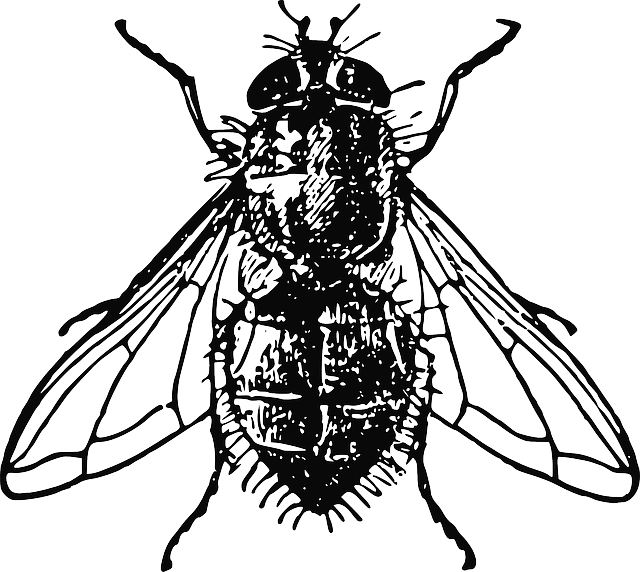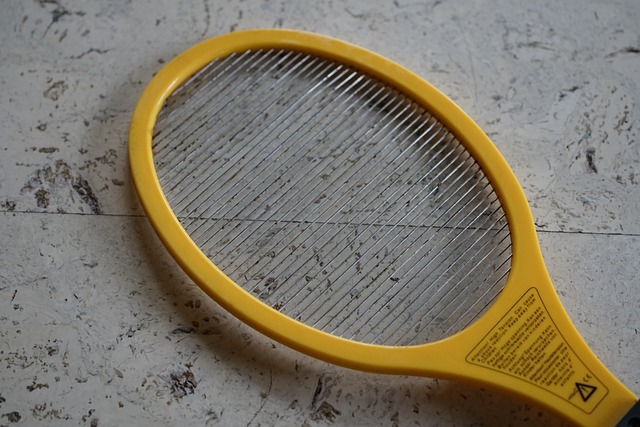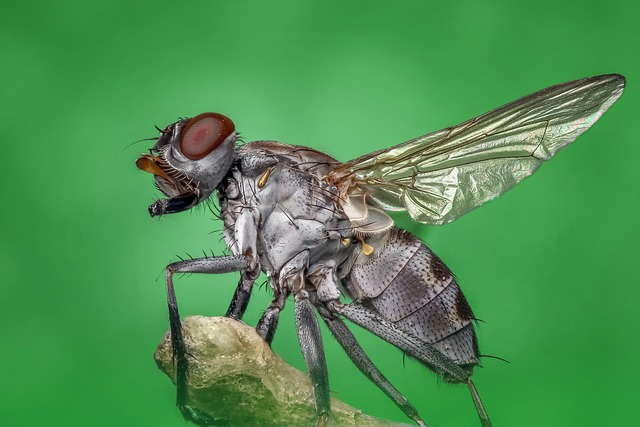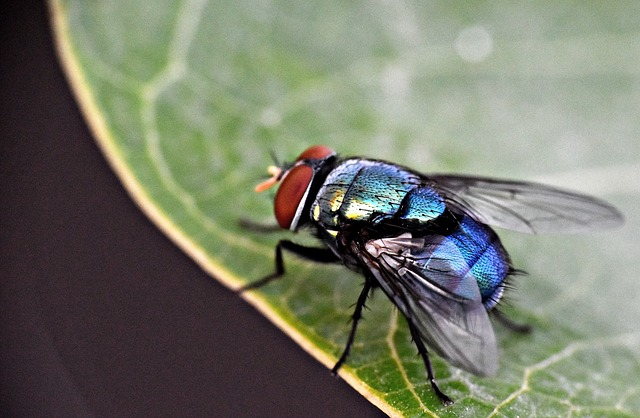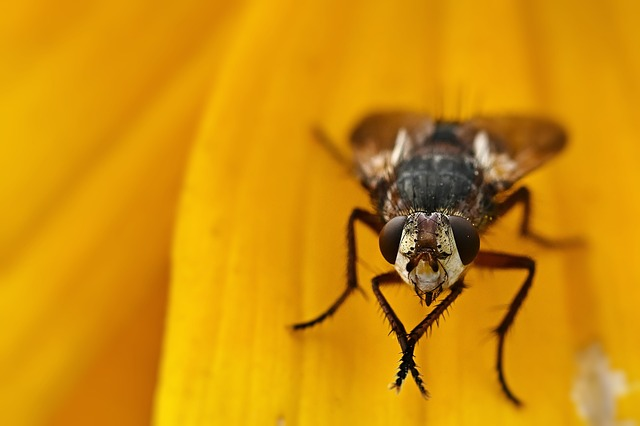Houseflies – those pesky, annoying insects that seem to multiply by the second. We’ve all experienced the frustration of swatting at them during a family meal or trying to enjoy a warm summer evening on the patio. But did you know that houseflies can pose serious health risks and spread diseases? In this blog post, we’ll provide you with a comprehensive guide on how to get rid of houseflies quickly and effectively at home, using various methods and remedies that cater to every household’s needs. Say goodbye to houseflies and hello to a cleaner, healthier home!
Key Takeaways
- Gaining an understanding of houseflies’ physical characteristics, breeding and feeding habits, and attraction factors is essential for effective management.
- Indoor fly control methods such as apple cider vinegar traps, homemade fly paper & essential oils can reduce numbers in living spaces.
- Outdoor strategies like garbage/waste management, pet cleanup & planting fly repelling plants are also helpful. Professional help should be sought if infestations persist or health risks arise.
Understanding Houseflies
Before exploring potential solutions, we should first get to know our tiny adversaries – houseflies and fruit flies. These seemingly insignificant insects have some unique physical characteristics, breeding and feeding habits, and specific attraction factors that make them a common household pest.
Gaining knowledge about these aspects of houseflies allows us to approach the problem more efficiently, fostering a fly-free home.
Appearance and Size
House flies, also known as house fly, are small, gray insects with the following characteristics:
- Slightly hairy bodies
- Four dark stripes on their thorax
- Measure approximately 1/8-1/4” (4 to 7.5 mm) in length
- Females are larger than males
- Compound red eyes, which contain thousands of individual lenses that provide them with an extended field of vision.
Their wide field of vision equips them with the skill to detect movement and evade our swatting attempts. Interestingly, houseflies do not possess teeth or a stinger, but their ability to spread diseases still makes them a significant threat to our health.
Breeding and Feeding Habits
Houseflies have a penchant for decaying organic matter, such as garbage, animal feces, and rotting food. They lay their eggs in these materials, and their larvae feed on them, making it crucial to eliminate their breeding grounds to get rid of housefly infestations.
Houseflies:
- Feed on liquids
- Attracted to pet waste, garbage, and even the smallest food spills in our homes
- Usually active during the day
- Tend to gather indoors on floors, walls, and ceilings.
Addressing their breeding and feeding habits can substantially minimize the prevalence of houseflies in our homes.
Attraction Factors
Houseflies, also known as house flies, are drawn to odors, food sources, and materials suitable for breeding. Their keen sense of smell makes them experts at sniffing out the scent of fermented and decayed items, such as garbage, food waste, and animal excrement.
Hence, maintaining a clean home swiftly eliminates houseflies. Proper sanitation and managing food waste deter flies from entering our homes and laying eggs on decaying materials.
In addition, houseflies are attracted to bright lights, so consider using light traps to control their presence indoors and effectively kill house flies.
Indoor Fly Control Methods
Although completely eradicating every housefly is impossible, numerous indoor fly control methods can help curtail their numbers, keeping your living spaces fly-free. Some of the most effective methods include apple cider vinegar traps, homemade fly paper, and essential oils.
These methods are not only cost-efficient but also eco-friendly, making them ideal for households looking for natural solutions to their fly problems.
Apple Cider Vinegar Trap
One simple and effective method to combat houseflies is the apple cider vinegar trap. Here’s how to create this trap:
- Mix apple cider vinegar, sugar, and a few drops of dish soap in a shallow bowl.
- Place the bowl in an area where flies are commonly found.
- The combination of apple cider vinegar and sugar serves as an attractant for the flies.
- The dish soap disrupts the surface tension of the liquid, causing the flies to drown in the mixture.
That’s all you need to do! By using this trap, you can effectively reduce the number of houseflies in your home.
Place the trap near areas where flies congregate, such as near windows or garbage cans, and watch as the flies are lured to their demise.
Homemade Fly Paper
Another effective indoor fly control method is homemade fly paper. You can easily make this by applying eucalyptus oil or other fly-repelling substances onto strips of paper and hanging them near windows or other areas where flies gather. The scent of the eucalyptus oil is repulsive to flies, making them less likely to enter your home.
This method is not only cost-efficient but also eco-friendly and safe for use around children and pets. Say goodbye to store-bought fly paper and hello to a fly-free home!
Essential Oils
Essential oils can also be used as a natural remedy to repel houseflies indoors. Some of the most effective essential oils for repelling flies include:
- Lavender
- Eucalyptus
- Peppermint
- Lemongrass
- Basil
You can either use a diffuser to spread the scent throughout your home or mix the essential oils with water in a spray bottle and apply directly to surfaces where flies congregate. With these aromatic oils, not only will your home be fly-free, but it will also smell amazing!
Outdoor Fly Control Strategies
Outdoor fly control is just as important as indoor fly control, as it helps prevent flies from entering your home in the first place. There are several outdoor fly control strategies that can be implemented to keep flies at bay, such as proper garbage and waste management, pet cleanup, and planting fly-repelling plants around your home.
These methods not only help reduce the presence of flies but also contribute to a cleaner and healthier outdoor environment.
Garbage and Waste Management
One of the most effective ways to control flies outdoors is by managing garbage and waste properly. This means ensuring garbage cans are securely sealed and kept away from entry points to your home, and regularly emptying them to prevent the buildup of decaying organic matter that attracts flies.
Additionally, promptly clean up any food scraps, animal waste, and rotting meat, as these materials serve as breeding grounds for flies. By maintaining proper sanitation outdoors, you can effectively deter flies and keep your home fly-free.
Pet Cleanup
To pet owners: controlling fly populations around your home necessitates cleaning up after your pets. Flies are attracted to animal feces, and if left unattended, they can lay eggs and multiply rapidly, leading to a fly infestation and flies inside your home.
Be diligent in picking up after your pets, disposing of their waste in sealed plastic bags, and keeping outdoor trash cans tightly sealed. By eliminating this major attraction factor, you can significantly reduce the presence of flies around your home.
Fly-Repelling Plants
Another natural way to repel flies and keep them at bay is by planting fly-repelling plants around your home. Plants like basil, lavender, and mint emit scents that are unappealing to flies, making them less likely to invade your outdoor spaces. These plants are not only effective in repelling flies but also add beauty and fragrance to your garden.
Say goodbye to chemical repellents and hello to a more eco-friendly and aesthetically pleasing solution!
Preventative Measures
The old adage ‘prevention is better than cure’ holds true for housefly infestations. Implementing preventative measures like home maintenance, proper food storage and regular cleaning can deter houseflies, promoting a clean, healthy living environment.
Being proactive and adhering to these simple steps can help bypass the trouble of managing housefly infestations initially.
Home Maintenance
Ensuring that your home is well-maintained is a crucial aspect of preventing housefly infestations. This includes:
- Inspecting window screens for tears and repairing or replacing any that are damaged
- Checking the caulking around windows and doors
- Reviewing the weather stripping around doors
Additionally, there are several methods you can use to control houseflies:
- Using light traps to attract and trap them
- Keeping your home in good condition to effectively keep flies out
- Maintaining a clean and healthy living environment
Food Storage
Proper food storage is another essential preventative measure in keeping houseflies at bay. Store food in sealed containers and promptly clean up spills and dirty dishes to eliminate food sources for flies.
By doing so, you not only prevent houseflies from being attracted to your home but also maintain a clean and hygienic living environment. Remember, a clean home is less likely to attract flies and other pests!
Regular Cleaning
Maintaining a clean home is one of the most effective ways to prevent housefly infestations. This includes regular cleaning of floors, countertops, and other surfaces, as well as drains and garbage disposals where flies may breed.
Implement a cleaning routine that covers all areas of your home and ensures that no breeding grounds are left for houseflies. A clean home is not only less attractive to flies but also promotes a healthier living environment for you and your family.
DIY Fly Traps and Remedies
Sometimes, despite our best efforts, houseflies still find their way into our homes. In such cases, DIY fly traps and remedies can come to the rescue. These cost-effective and eco-friendly solutions include soda bottle traps, vinegar and dish soap traps, and fruit-based traps.
By using these simple remedies, you can effectively get rid of flies and reduce their presence in your home, keeping them at bay.
Soda Bottle Trap
One popular DIY fly trap is the soda bottle trap. Here’s how to make it:
- Cut off the top third of an empty plastic bottle.
- Add sugar water to the bottom third of the bottle.
- Place the cut piece upside down to create a funnel.
- Place the trap in areas where flies congregate, such as near windows or garbage cans.
- Watch as flies are lured in and trapped by the sweet liquid.
This simple yet effective homemade fly traps can help reduce the presence of houseflies in your home without the need for harsh chemicals or plastic wrap.
Vinegar and Dish Soap Trap
Another effective DIY fly trap is the dish soap fly trap, which uses vinegar and dish soap. Here’s how to make it:
- Mix vinegar, dish soap, and sugar in a shallow bowl.
- Place the bowl in areas where flies are a nuisance.
- The vinegar and sugar mixture will attract flies.
- The dish soap disrupts the surface tension of the liquid, causing the flies to drown.
This simple, inexpensive, and eco-friendly trap is an excellent solution for getting rid of houseflies quickly and effectively.
Fruit-Based Traps
Fruit-based traps are another DIY solution for housefly infestations. One example is placing banana slices in a glass jar and covering it with a plastic bag with holes for flies to enter. Another option is inserting cloves into a half-cut apple and placing it in affected areas of your home.
These fruit-based traps are not only effective in attracting and trapping flies but also safe and eco-friendly, making them an ideal solution for households looking for natural remedies.
When to Call a Professional
Although DIY fly traps and remedies can effectively control housefly infestations, some situations necessitate calling a professional exterminator. Persistent infestations, ineffective home remedies, or health risks associated with houseflies are all valid reasons to seek professional help.
A professional exterminator can assess the situation, pinpoint the breeding sites, and formulate a successful treatment plan to rid your home of houseflies once and for all.
Persistent Infestations
When all DIY methods have been attempted and the housefly infestation still persists, it’s time to call a professional exterminator. Eliminating housefly infestations can pose a challenge, particularly when their breeding sites are tough to locate or access.
A professional exterminator can assess the situation, pinpoint the breeding sites, and formulate a successful treatment plan that will rid your home of houseflies and ensure they don’t return.
Health Risks
Houseflies, known transmitters of diseases like salmonellosis, dysentery, cholera, and typhoid fever, can pose significant health risks. If you suspect that your housefly infestation poses a threat to your health or the health of your family members, it’s crucial to contact a professional exterminator.
They can help identify the source of the infestation, implement effective treatment measures, and provide guidance on how to prevent future housefly infestations. Don’t risk your health – call a professional exterminator when necessary.
Summary
In conclusion, getting rid of houseflies quickly and effectively is possible with the right knowledge, methods, and remedies. Understanding houseflies, implementing indoor and outdoor fly control strategies, and taking preventative measures will help you maintain a clean, healthy, and fly-free home. Whether you choose DIY fly traps and remedies or decide to call a professional exterminator, the key to success lies in being proactive and diligent in your efforts. Don’t let houseflies rule your home – take action now and enjoy a more comfortable, hygienic living environment.
Frequently Asked Questions
Why is there so many flies in my house all of a sudden?
It appears that a rotting organic matter such as food, feces, and more is likely the source of your sudden influx of houseflies. This provides an ideal breeding ground, thus attracting flies from all around.
What smell will keep flies away?
Using essential oils such as eucalyptus, lavender, citrus, pine, clove, peppermint and thyme can help keep flies away, as the odours act as a repellent.
How do you get rid of flies indoors ASAP?
Try setting up a trap with a shallow bowl filled with an inch of apple cider vinegar, a tablespoon of sugar and some dish soap; you can also use sticky tape, strong scents or pheromone attractants, or natural remedies such as planting herbs or using fly paper. These methods should help you get rid of flies indoors quickly and easily.
What is the best home remedy to kill flies?
For the best effect, mix equal parts of white vinegar and dish soap in a bowl and place it near sources of flies. This breaks the surface tension of the mixture, sucking them in and drowning them.
What are some effective indoor fly control methods?
Effective indoor fly control methods include setting apple cider vinegar traps, hanging homemade fly paper, and using essential oils to repel flies.

